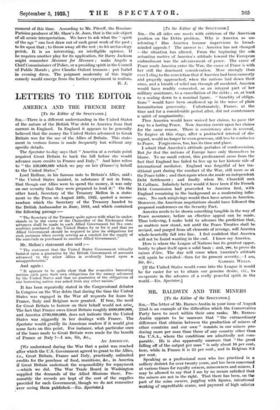LETTERS TO THE EDITOR
AMERICA AND THE FRENCH DEBT
[To the Editor of the SPECTATOR.] SIR,—There is a different understanding in the United States of the nature of the British War debt to America from that current in England. In England it appears to be generally believed that the money the United States advanced to Great Britain was for the use of the Allies of Britain. This state- ment in various forms is made frequently but without any specific details.
The Spectator to-day says that " America at a certain point required Great Britain to back the bill before she would advance more credits to France and Italy." And later refers to " the £30,000,000 which we pay on her (France's) behalf to the United States."
Lord Balfour, in his famous note to Britain's Allies, said : " the United States insisted, in substance if not in form, that though our Allies were to spend the money, it was only on our security that they were prepared to lend it." On the 'other hand, Secretary of the Treasury Mellon in a state- ment to the Press on August 24th, 1922, quoted a memo- randum which the Secretary of the Treasury handed to the British Ambassador in June, 1918, and which contained the following passage :—
" The Secretary of the Treasury quite agrees with what he under- stands to be the views of the Chancellor of the Exchequer that advances shall be made to each Allied Government for the com- modities purchased in the United States by or for it and that no Allied Government should be required to give its obligations for such purposes when merely serving as a conduit for the supply of the materials so purchased to another Allied Government."
Mr. Mellon's statement also said :-
" The statement that the United States Government virtually insisted upon a guarantee by the British Government of amounts advanced to the other Allies is evidently based upon a misapprehension."
And again :
" It appears to be quite clear that the respective borrowing nations each gave their own obligations for the money advanced by the United States and that no guarantee of the obligations of one borrowing nation was asked from any other nation."
It has been repeatedly stated in the Congressional debates in Congress on the War debts that during the time the United States was engaged in the War all requests for loans by France, Italy and Belgium were granted. If true, the need for Great Britain to borrow on their behalf would not arise, The fact that France owes Great Britain roughly £600,000,000, and America £790,000,000, does not indicate that the United States was .niggardly in her dealings with France. The Spectator would gratify its American readers if it would give some facts on this point. For instance, what particular ones of the loans made to Great Britain were made for the benefit of France or Italy ?—I am, Sir, &c.,
AN AMERICAN.
[We understood during the War that a point was reached after which the U.S. Government agreed to grant to the Allies, i.e., Great Britain, France and Italy, practically unlimited credits for the purchase of food, munitions, &c., in America if Great Britain undertook the responsibility for repayment —which we did. The War Trade Board in Washington supplied the demands of the Allied Missions there. Pre- sumably the records are kept of the cost of the supplies provided for each Government, though we do not remember lever seeing them published.—En. Spectator.'










































 Previous page
Previous page